You’re listening to Burnt Toast! This is the podcast where we talk about diet culture, anti-fat bias, parenting, and health. I’m Virginia Sole-Smith. I also write the Burnt Toast newsletter.
Today I am chatting with Elise Hu, a journalist and podcast host of TED Talks Daily and the founding NPR Seoul bureau chief. Elise has recorded stories from more than a dozen countries, mostly across Asia, as an international correspondent. She’s also a mom of three and a human prone to freak injuries based in Los Angeles. She is the author of the brand new book Flawless: Lessons in Looks and Culture from the K-Beauty Capital which we are here to discuss today.
This book is fascinating. I could not put it down. If you have ever purchased a sheet mask or a babyfoot peel or any other K beauty products or if you’ve just been aware of the absolute phenomenon of Korean beauty culture, you need to read Flawless. Elise writes with so much compassion and wisdom, impeccable research and reporting, as she tells the stories of Korean women navigating a culture with really strict beauty and weight ideals. There’s just so much to unpack and a lot that is helpful in thinking about our own relationships with beauty and beauty work and activism around it.
And remember, if you order Flawless from the Burnt Toast Bookshop, you can get 10 percent off that purchase if you also order (or have already ordered!) Fat Talk! (Just use the code FATTALK at checkout.)
Episode 96
Virginia
You lived in Seoul for four years to be the NPR bureau chief there. What did you know about Korean beauty culture going into it? Did you think there would be a book in it?
Elise
Never. No. I did not think there was going to be a book in it at the time and I still can’t believe one exists, knowing my personality. I have a very short attention span. I also don’t like to write alone or even be alone with my thoughts. And as you know…
Virginia
There is some of that required. It’s hard to get around that.
Elise
I didn’t know a whole lot about Korea, period, when I got posted out there. I think that was part of the motivation for NPR. They liked my journalistic style of being a fish out of water and exploring a place and explaining it and reporting it out with the listener. That was the end of 2014 when we first started having conversations about opening up a Northeast Asia Bureau. So by the beginning of 2015, never having set foot in South Korea before, I moved my husband, my toddler, my geriatric Beagle, two cats, and a baby in my belly all over to Seoul, a place where I hadn’t so much as had a layover at the airport.
Part of the excitement in it for me was that it was Northeast Asia, a place where we hadn’t turned the lights on as a news organization before. We just really hadn’t had anybody permanently posted there. So I would cover not just South Korea, but also North Korea and Japan—and what an exciting region. There’s a huge US military presence there, too, that I think gets under-covered. I think half of all of US military stationed overseas is in Korea and Japan.
Virginia
Oh, wow. I didn’t know that.
Elise
There was so much to learn. What did I know about Korean beauty culture at the time? I knew that sheet masks were getting cool. A lot of my friends who were the more in-the-know, hip ones, the ones that read The Cut every day and knew about all the coolest ingredients and the best treatments that were available, they were really into K beauty culture already. Because K beauty culture, as I found, is often not just years ahead, but a decade ahead when it comes to various skincare innovations.
So I knew about sheet masks, I knew a little bit about the packaging, I knew that Chinese tourists were going to Seoul a lot to try and load up on various products. I knew about the plastic surgery. I think I really saw it as vanity at the time. I had my Western judgmental attitude about it, when I first got to Seoul.
Virginia
You really explode this concept of vanity and this myth that women engage in beauty work because we’re shallow or we’re looks-obsessed. You talk about understanding beauty work—whether it’s skincare, plastic surgery, weight loss, all of it—is a survival strategy, particularly in a culture with high rates of lookism and fatphobia.
Elise
It absolutely is. I mean, the entire concept, the term “lookism,” was new to me. When we say lookism, it’s appearance-based discrimination. Lookism works in all these insidious ways, obviously to marginalize people, but also it can reward those who do focus on their appearance and do the work of improving it to better match the prevailing culture and beauty standards of the day.
Having good looks is framed as your personal responsibility. Obviously it’s a very feminine look—you’ve seen Korean K-pop girl groups—so that generally is the model for how a Korean woman should look. If you don’t at least try to match that standard or if you fail, it’s seen as a personal failing. And hard work then means work on your body. And it problematizes all sorts of bodies that don’t fit. Something that I learned very early on was that my size wasn’t welcome in Korea.
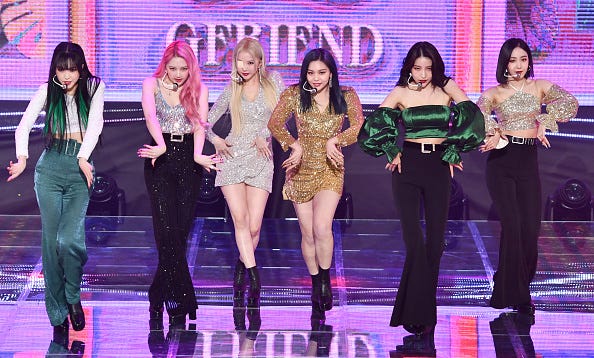
Virginia
I do want to talk about the concept of the “free size,” which is one size fits all/one size fits no one? I mean, what?
Elise
I have a chapter called “Free Size Isn’t Free.” Because at so many of the boutiques for the cutest clothes—the stylish ones, the indie boutiques—the clothes come in “free size,” but free size is the equivalent to the to a US size 2. I felt so unwelcome in Seoul in my own body and just appearing as I did. It wasn’t just size, though I think thinness is such a pillar of global beauty standards that it cannot be divorced from lookism, the venn diagram almost overlaps such that it’s one circle. But it was also having freckles!
Virginia
Yes! I was fascinated by the freckles thing!
Elise
Having freckles, it was like I might as well have had pus-eating boils on my face.But freckles are a window into how South Korea not only exports these images of beautiful Koreans and sells that all tangled up with K-pop, K-drama and its pop culture might around the world. It also exports the medical aesthetic upgrades that you can get to improve your face and skin and bodies. The comments I would get were something like, “Oh, you have freckles, we can fix that. Why wouldn’t you fix that?” So, if the technology or the solution exists to fix the problem, of course you should get rid of your freckles. Of course you’re not good enough as you are. When we have a solution, like, why not? It makes no sense.
Virginia
It’s a really strong parallel with the conversation we’re having now around Ozempic, where people are like, well, if it finally exists, there’s a drug that you can help you lose weight, why wouldn’t you lose the weight? And there’s no discussion. Well, Burnt Toast knows I’m discussing it, but the mainstream conversation has not been discussing how much that is erasure of people’s bodies. Freckles are natural, they are part of skin! Like, why do we need to erase them?
Elise
Diversity is part of the human experience. It’s actually part of nature, too. I don’t go to a pet adoption center and only find Golden Retrievers worthy, right? It just doesn’t make any sense to me. Our adherence to beauty culture, our adherence to lookism is so familiar that we barely notice it. But as you have said, the appropriate response to homophobia isn’t to make everyone straight, and the appropriate response to anti-fat bias isn’t to make everybody skinny. The appropriate response to lookism isn’t to make everybody pretty. Except when I lived in South Korea, I found that it was completely logical to make yourself prettier—because of the professional and personal and social costs if you didn’t.
Virginia
It is asking people to pay this high price to opt out of a system when it’s that entrenched.
Another piece of this that was really helpful for me to learn about was I thought I understood a lot of the Korean beauty ideals as being rooted in Whiteness, but they’re really not. I wondered if you could talk us through that a little bit because that was super fascinating.
Elise
The desire for white skin certainly predates war and colonization, even. The desire for white skin was about a class performance dating to the earliest dynasties in China, Korea and Japan. The aristocratic women, the ones who didn’t have to go outside, had the fairest skin. And those who had to work the fields had darker skin. So there was a real aspiration to Whiteness that was about class. We see throughout civilizations and various time periods that beauty work really is about class. So often, when we see people who you would describe as conventionally pretty, you’re really describing that they’re conventionally wealthy.
Virginia
It’s money.
Elise
Right. The people who can look the closest to physical ideals are often the ones who can afford to spend the most money. Another strain that comes out of this is the idea of the no-makeup makeup look, or affecting effortlessness out of effort. Being able to look like you just got out of bed and didn’t put on any makeup is largely the work of lasers or eyelash extensions or skincare treatments that cost thousands and thousands of dollars and lots of time and research and the labor of other people, which can be extractive, especially in the US. And that doesn’t get factored into the equation at all. We should just be aware of it.
Virginia
And concepts like glass skin. That was another fascinating concept and how that is a completely manufactured attempt to look natural, sort of.
Elise
Right, right. Think about how many serums or how much care and attention and how much free time you would have to have to devote to getting your skin to a level of looking reflective like glass. I don’t have that kind of time. I think most women do not.
Virginia
No, I know you’re a mom of three. I’m a mom of two. I don’t have ten step cleaning practices in my day. I don’t want a recipe to have 10 steps. Nothing can have ten steps.
Elise
Some of the interview questions I’ve gotten as I’ve launched this book include “What do you do for your skin?” And first of all, it focuses on the wrong thing because this is not the an individual thing, right? When I get questions like, “should your daughter shave or laser?” I actually think that we’re putting the focus on individuals when we shouldn’t because it ends up resulting in us judging one another when the focus really should be these cultural forces that keep us on a hamster wheel.
But also, my answers are so just boring. I’m just like, “well, I wash my skin and I moisturize.”
Virginia
Sunscreen seems nice.
Elise
Sunscreen is the main takeaway. I am a thinker on beauty topics, but I am no beauty blogger. These are separate things.
Virginia
I get a lot of those “what do you do?” questions, too, and I think it also speaks to how much the system has sold us this idea of personal responsibility and personal labor, as you’re saying. That this is your job, to take care of your body in this way. So then even when we’re critiquing it, we’re like, “but what do you do?” because we want you to tell us what we can opt out of. It’s a very diet culture mindset.
Elise
This personal responsibility then extends to maternal responsibility or parental responsibility. Like the way that mothers get held responsible for their children’s weight is something that I saw in South Korea not just with regard to weight, but also with regard to their children’s looks. So mothers and grandmothers were often the ones who were gifting plastic surgery to their high school graduates because they wanted to ensure a brighter and happier future for them.
Never mind that we have tangled up health and happiness with good looks. That is already questionable and problematic and wrong, but then your maternal love gets wrapped up into whether you are helping and assisting your child in or teenager in looking “better.” And that was really heartbreaking.
An anecdote that was shared with me by one of the women that I interviewed who talked about how her father made her watch pageant videos so that she could learn how to walk properly and learn how to walk more like a lady. So she would have to watch those videos every night and then and feel anxious and self conscious about her body and then she would have to actually walk and perform for her father to see whether she had absorbed the lessons of what she was watching on the pageant videos.
And I asked her, “What happened if you didn’t? What happened if you refused?” and there was just no notion that she could even refuse. There was the filial piety involved. But she said she worried that her parents would have starved her because it mattered to them so much that she be able to have a fulfilling life and that meant being thin enough to find a husband.
Virginia
Yes, she said, “They basically already were so I just thought it would get so much worse.” It was chilling. And it’s so easy to want to judge those parents and think, like, what a creepy thing to do to your kid.
Elise
But it’s economically rational.
Virginia
It’s hard to know that your child will face such stigma and derision if you don’t participate in this.
Elise
I’m curious, with the parents that you talked to who felt as though they needed to restrict their children’s eating, where did they end up landing for the most part? After being presented evidence on how the long tail effects aren’t good, nor do they even necessarily maintain whatever weight they were trying to achieve.
Virginia
It was a real range. There’s one mom in the book who I still think about a lot who was really on board with wanting to do things differently and then the pediatrician shamed her for how much weight her son gained during the pandemic. And she was like, “I’m back on Weight Watchers. He’s going to the Healthy Weight clinic. We’re back in.” And then there were others who were really relieved to realize they could opt out of the system. But I think there’s a lot of privilege involved and who can safely opt out.
Elise
That’s true for opting out of beauty culture, as well. There are plenty of women who don’t have the privilege of being able to opt out. Notably, the trans women of South Korea. There’s still no anti-discrimination law in South Korea and trans women feel unsafe all over the world, but in South Korea they are such outcasts. There’s not a lot of social understanding about transgender people. There are plenty of trans women who said, “We do not support the beauty culture that we live in and find it oppressive. At the same time, appearing femme is a matter of survival for us. We need to pass in order to safely move about the world without being assaulted.”
Virginia
It is so scary. There were parts that were so familiar, too, like the way you said the only Korean words your daughters learned were cute and pretty because that’s how everyone addressed them. That’s true for American little girls, too, right? You’re in the diner and the waitress is like, “You’re so pretty.” And I’m just like, “and smart…”
There’s definitely a universality to how we engage with girls as objects from childhood. But it did seem like there were specific ways it played out that seemed quite different from how it plays out in America.
Elise
One reason why the beauty culture in South Korea is so extreme—and there are many factors, one is technology. The technology infrastructure and its status as one of the world’s first fully wired nations means that it’s an increasingly visual and virtual society and it’s becoming more visual and virtual faster than the rest of the world. So that’s a huge component.
But there are also cultural reasons that make the beauty culture a little bit more oppressive, or noticeably oppressive. And it’s that 97 percent of Korea is Koreans, which is certainly not the case in the United States. So it was really hard, for example, for me to find cover up makeup, the BB cream cushion that I get into the history of, I couldn’t find it in my shade because I’m a little bit of a darker Asian.
And it follows with “free size” as well. There’s such a critical mass of people with the same shape and people of the same size that the companies don’t go to the trouble of expanding their lines. So instead of the clothes changing to fit you, you change to fit the clothes. Instead of the cover up needing to come in different shades, you stay out of the sun or you just wear a lighter shade. There were often times where I would go get makeup done for a television interview in Seoul, and they would just make me chalky white because it was like, “This is what we got.”
Virginia
And we’ve covered your freckles. We assume you’re thrilled about that.
Elise
Oh yes. The freckles were gone.
Virginia
I was really fascinated by how it played into the revering of elders. Kids don’t really have these other options, like the for the girl to say to her father, “I’m not going to practice the walk,” is just not part of the conversation at all.
Elise
There was this theme of choice but not a choice. So much of our aesthetic labor under capitalism gets coded as empowerment. You think you’re choosing the new injectable, you’re thinking you’re choosing the laser removal of your blemishes or whatever. And while that is a choice, it’s not necessarily liberation and freedom to be however you want to be.
Virginia
I think about that a lot when people say to me, “but what if I just want to lose weight? Just for me. I just want to lose it for me.” There’s no making that choice in a vacuum here.
Elise
We’re not islands.
Virginia
There’s no “just for you” because you’re part of this whole thing. I was thinking a lot about pedicures as I was reading this, because I remember during COVID, I tracked down the baby foot peel things because I couldn’t go get pedicures. And I remember doing them one night and being like, “I’m not even leaving house. Am I enjoying sitting with my feet in the bathtub for half an hour so that the skin will all peel off in two days? I don’t know if I like this.”
Elise
There’s so much beauty work that I do enjoy so long as it doesn’t feel like I’m doing it because I’m worried about what others will think. When I wrote about older Korean women, the ajummas, they found a way or arrived at a place where they care for one another and care for their bodies in a way that’s kind of reciprocal. It’s like showing respect for one another. So they’re not completely unkempt because it’s group cohesion. They’re not competing against one another. I think in younger women’s groups we can often kind of get into competitive or hierarchical thinking or feel as though we have to keep up with everybody else’s Botox, whatever it is.
I think interrogation is key. Like, ask yourself, is this an ego driven decision? Or does this come from an inner appreciation for my body and what I what I want for it, what I want to do to care for it.
And I write about how when women are outliving men, so often the touch of a beauty worker, somebody who is giving you a pedicure or or giving you a massage or a facial might be the only time you are touched by another person in the course of a week or a day even. So there is something really lovely about the touch and that nurturing feeling of beauty workers, so I don’t reject it out of hand. I certainly don’t want Flawless to come off as a polemic.
Virginia
No, and it doesn’t.
Elise
It actually wrestles with with it. There’s a lot to celebrate, I think, about the way we can care for one another and our bodies. I just think that it needs to be in a framework of community, always, and not like, “what about me?”
Virginia
Right and being realistic about what is a necessary cost of doing business to exist in this world or in this profession or whatever. In Korea, it’s common for people have to put their height and weight and photos on their job applications for any career.
Elise
That’s a huge example of the lookism. Another example is there’s myriad matchmaking firms in South Korea, so you can date through the apps, but you can also just go to a matchmaking firm, and there’s thousands of them. And the matchmaking firms will rate people with in terms of specs, like the way that we use specs to describe the specs of my MacBook Air or the size of my phone. So specs have an entire range of things that you’re supposed to look like, right? Your specs can include your height, your weight, your bra size, whether you possess a certain cuteness that that will get ranked by the agencies. So it’s just insidious. It’s pervasive. It’s everywhere.
Virginia
Talk to me more about the cuteness thing because that was something really interesting that was threaded throughout. The cuteness of the packaging. The celebration of cuteness. Cuteness is a beauty ideal in a way that I hadn’t really thought about. And then again, when we’re thinking about children, it also helps them market all these products younger and younger.
Elise
So the social and ethnographic research by a philosopher named Heather Widdows, whose research undergirds a lot of my book, found that there are four global beauty pillars: Thinness, firmness, smoothness, and youth. I really see cuteness as tied in with the youthfulness.
So it’s a beauty ideal on one hand, but it also shows up in the way that beauty products are sold. So something that’s really distinctive about K beauty products is the way that packaging is made to look like food, or the form factor continually changes. It will start as lip color that that came in a tube like lipstick has always, but they’ll change it to make it a lip stain that comes out of a nail polish container. And then it’ll change into something else. The churn is very fast. And then you can retire and introduce new products constantly.
And then, because of the cuteness, it seems as though younger and younger groups, younger and younger demographics could participate in it. So if you’re a teenager, you’ve already been surrounded by these little fruit shaped lip balms, moisturizer in milk carton containers since you were in elementary school. It’s only natural that you would creep into using skincare and using using makeup products very young because it almost seems childlike.
Virginia
They seem like toys. You talk about the stats on how young kids start wearing makeup there.
Elise
Yeah it’s usually like six or seven, but not for everyone.
Virginia
That is young.
Elise
Especially because it is time and energy that we could be spending elsewhere. And when kids are also having to internalize this idea that their their existence is for somebody else’s eyes, for somebody else’s gaze so young. My eldest daughter is now 10—how old is your oldest?
Virginia
She’s almost 10 as well.
Elise
I feel like she’s now at the age where she’s noticing the way she is seen and is able to articulate it. I’m sure that they noticed this much younger. But it just breaks my heart a little bit that they’re getting this notion very, very young that they have to perform. Korean girls get little lipstick pockets. Lipstick pockets are part of their school uniforms. So there’s an idea that you need to have lip balm or lip tint inside.
Virginia
It’s like a school supply. You need your pencils and your lip tint. That is definitely something I had to sit with.
I feel like a core argument of what I’m doing is to talk about body autonomy. One of the casual tips I often give parents is don’t fight so hard on the hairbrushing. Let them pick out their own outfits. And I’m just realizing that there’s a lot of Western privilege underpinning that as a strategy. That I can give my kids that kind of freedom and they won’t be policed if they go to school with their hair unbrushed. I think our school is just like, “well, that’s Virginia’s kids.” There’s no social cost to it, especially for little thin white girls, to show up looking messy.
Elise
I join you in these conversations and in the struggle for progress, because to me progress would be being able to opt out and not pay a price. Because the demands of beauty culture require tremendous resources and the costs right now—the social costs, the economic costs to opting out—are too great. So technology is a big part of a lot of these conversations because we are presented and barraged with beauty ideals and thinness ideals through social media.
But the other end of technology that I think doesn’t get talked about enough is all of the self-improvement technology that is now available. Because when there are advances like, self checkout, people are like, well, I’m going to change my behavior to use it. So when there are advances like lasering off those blemishes or those freckles from your skin, then there’s an assumption that I will use it. But crucially, these are all markets that are created for us. And often I think the supply creates the demand. That’s certainly true for a lot of things happening with plastic surgery and cosmetic fixes in general, like this buccal fat removal which is the most searched procedure in the United States in 2023.
Virginia
I still don’t totally understand what it is and I’m okay with that. But you should also tell us about it.
Elise
It’s just removing removing excess fat from the jawline so that your jaw looks a lot more defined, gets rid of the double chin. But why are double chins bad? Like, why can’t some people have puffy faces? Why can’t my fat distribute however it’s gonna distribute?
Virginia
It will land where it lands! As someone who identifies as small fat I’m like, we can take it off my chin, but I’d still be fat. So I guess I just sort of ignored that one. But I can understand why that’s getting pushed so hard. The economics of all of this is just fascinating.
I do want you to tell us about the Escape the Corset movement, because I feel like we need a little hope.
Elise
So, in South Korea, women are ridiculed for attempting to capitalize on their appearance. So if you get too much plastic surgery or you seem like you care too much, then you’re ridiculed. But then you’re even more ridiculed if you seem like you don’t care at all and don’t do anything.
Virginia
There’s a very narrow lane of getting it right.
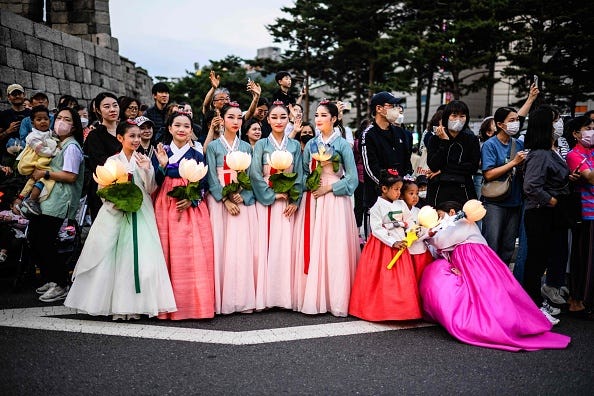
Elise
And it’s usually that effortless look, right? So the Escape the Corset women are Korean feminists who in 2018, my last year in South Korea, took part in what I would describe as a general strike against aesthetic labor. They were just like, “we’re not going to do this anymore.” And they catalogued how much money and time and energy they were spending on trying to look like the ideal Korean woman. They crushed their compacts and took photos of them with the hashtag #proofofdiscardedcorset. They made videos of them cutting off all their hair. They now wear largely unisex clothing and appear as they want in a country where their appearance matters the most.
And they are often uninvited from family gatherings, they are bullied by their peers, they are chastised by their managers. Some have lost jobs, some have even been reportedly assaulted as a result of not participating and not looking like the ideal Korean woman.
But they’re so brave and also inspiring because the risks that they take in order to just have bodily autonomy are so much greater than the risks that I take in appearing as I do, which is much like them, on the streets of Los Angeles. They really stick out and they continue to.
I had a Zoom with them on Saturday night and it was probably my favorite thing that I’ve done in the promotion for Flawless. They said under this conservative administration that they’re under now, male pattern baldness and treatment for that is covered by the National Health Insurance, but treatment for eating disorders is not.
Virginia
I mean, that’s only the most fatal mental health condition. Why would we do that?
Elise
But male pattern baldness is now covered! Anyway, so they are really down and discouraged and disillusioned, but continue to fight and continue to organize. And they talked to me about how they want to be good ancestors. They don’t want the next generation of men and women coming up in South Korea to feel the same lack of safety and lack of feeling welcome in their own society and then just the oppressiveness of a lookist culture. So they’re continuing to do the work and I admire it so much because these are huge risks to take.
Virginia
Truly, icons. Yeah, I don’t know what we can do from here to support it, but if you know where we can send dollars or support of any kind, please tell us because that’s really important.
Elise
I will do that.
Butter
Virginia
Well, Elise, I would love to know what your Butter is.
Elise
Mine are the squiggly noodles from Trader Joe’s. Eating them as a snack. Squiggly noodles come in a pack like instant ramen noodles would come in a pack. And they come with a soy and sesame sauce. And they take I think four minutes to prepare. I chop up some cucumbers and maybe some tofu and gussy up my squiggly noodles a little bit.
But they are inspired by the knife cut noodles of the Shanxi province in China. And they are awesome. So they come out really squiggly because they mimic the way that knife cut noodles, when you’re shaving them off a block, they’ll come out squiggly. And they are delicious. My Tiktok just sends me like convenient food ideas constantly.
Virginia
My Tiktok needs to do that.
Elise
That’s a sub-tiktok world that I’ve fallen into and I love it. It brings me so much joy.
Virginia
That’s great.
Elise
The squiggly noodles take four minutes and I think they cost like $4.
Virginia
That is an excellent Butter. Thank you.
Mine is I just got my new spring Birkenstocks. I have a little bit of a love/hate with Birkenstocks because they’re very expensive. And you really don’t get more than like two seasons out of them. So I feel like I buy a new pair every year. But they are the most comfortable shoes and it makes me so happy.
It really always gives me this moment of reflection because when I first left New York City and moved—I live in the Hudson Valley now—I had a whole emotional journey about was I going to become a Birkenstock person. This was before they were cool. This was like 2008, before they were like on runways and had gotten their glow up. I just think a lot about like 20-something me with so many pairs of high heels at the office. I still pay for it with the lower back issues. So yeah, I’m in my 40s and I just wear my Birkenstocks and I’m really happy. I got them in this cool olive green and I’m very excited about it.
Elise
I love it. That does sound so comfortable. It reminds me of that test for what we do or don’t do with our bodies when it comes to body care and rituals. If it feels like a greater step into yourself, like the Birkenstocks are for you, then absolutely that’s the way to go. But if it feels like you are wearing something or doing something that is more tantamount to a costume, like high heels, then that that choice is also made for you.
Virginia
I just think how hard it was to walk around Manhattan for years. It was so difficult. But I worked in women’s magazines, there was no world in which you didn’t wear heels to the office.
Elise
It was what the culture required of you, so much like the Korean women. This is what the culture requires and so I have to occupy space this way.
Virginia
So I would walk to work in my flip flops and then I left on my shoes under my desk. When the last magazine I worked for folded, I had to messenger home like 30 pairs of shoes.
Elise
I’m so glad that that experience has helped inform what you were doing now as a body liberation journalist.
Virginia
Well, I am so grateful for your work, Elise. The book is incredible. It is called Flawless: Lessons in Looks and Culture from the K-Beauty Capital. Everyone needs to check it out. Tell us how can we support you. Where can we find your work?
Elise
You can find me at EliseHu.com That’s where all the events on the book tour are going to show up and where you can find out more information about the book. I hang out on the dredges of Twitter only occasionally now—what’s left of Twitter. I’m @elisewho and I’m hanging out more on Instagram @elisewho.
The Burnt Toast Podcast is produced and hosted by me, Virginia Sole-Smith. You can follow me on Instagram or Twitter.
Burnt Toast transcripts and essays are edited and formatted by Corinne Fay, who runs @SellTradePlus, an Instagram account where you can buy and sell plus size clothing and also co-hosts mailbag episodes!
The Burnt Toast logo is by Deanna Lowe.
Our theme music is by Jeff Bailey and Chris Maxwell.
Tommy Harron is our audio engineer.
Thanks for listening and for supporting anti-diet, body liberation journalism!

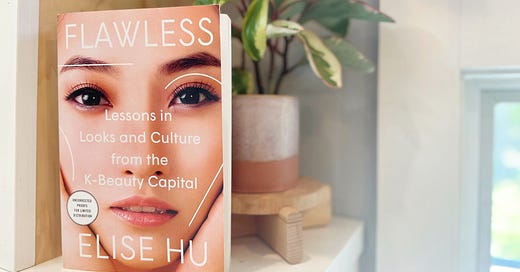



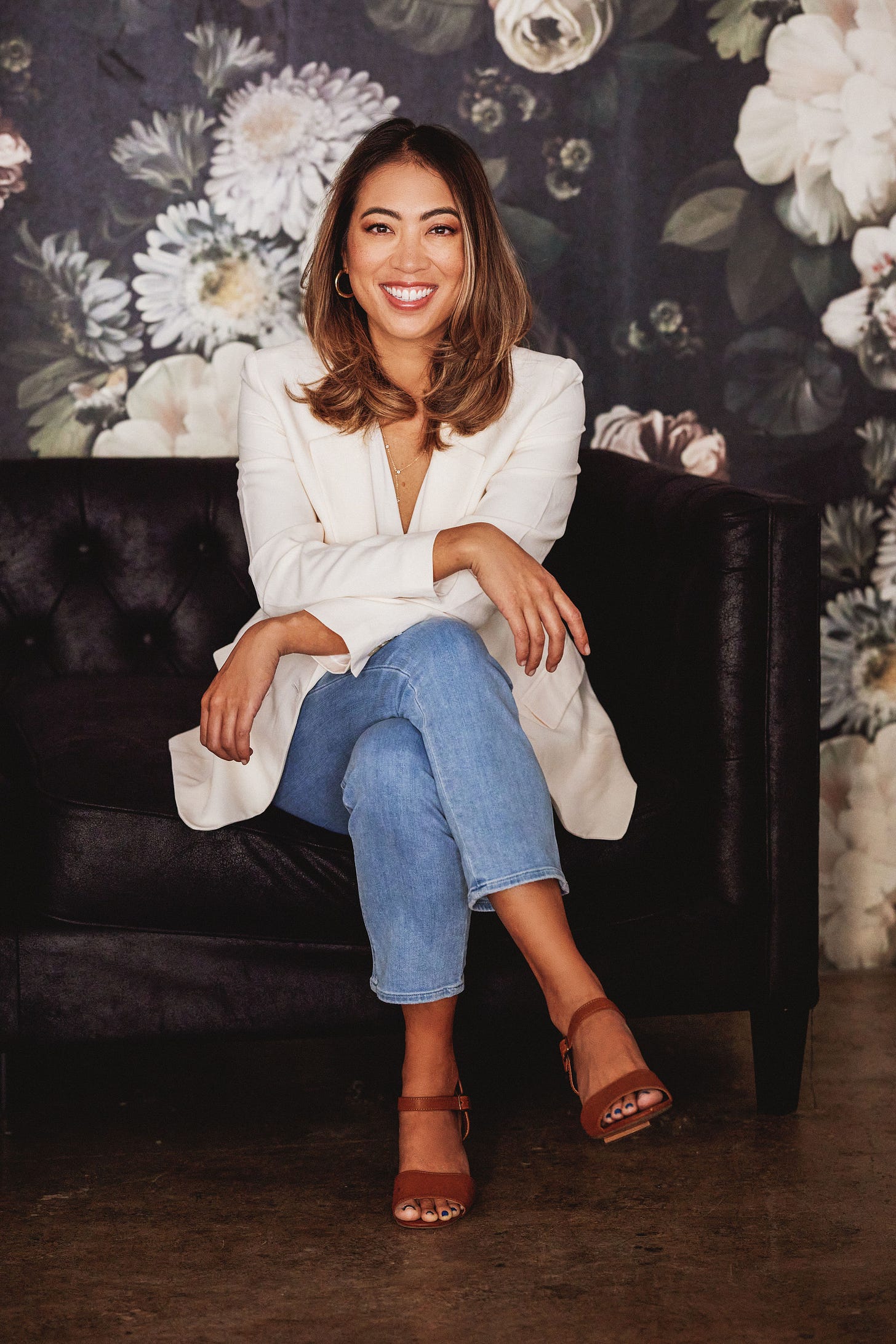
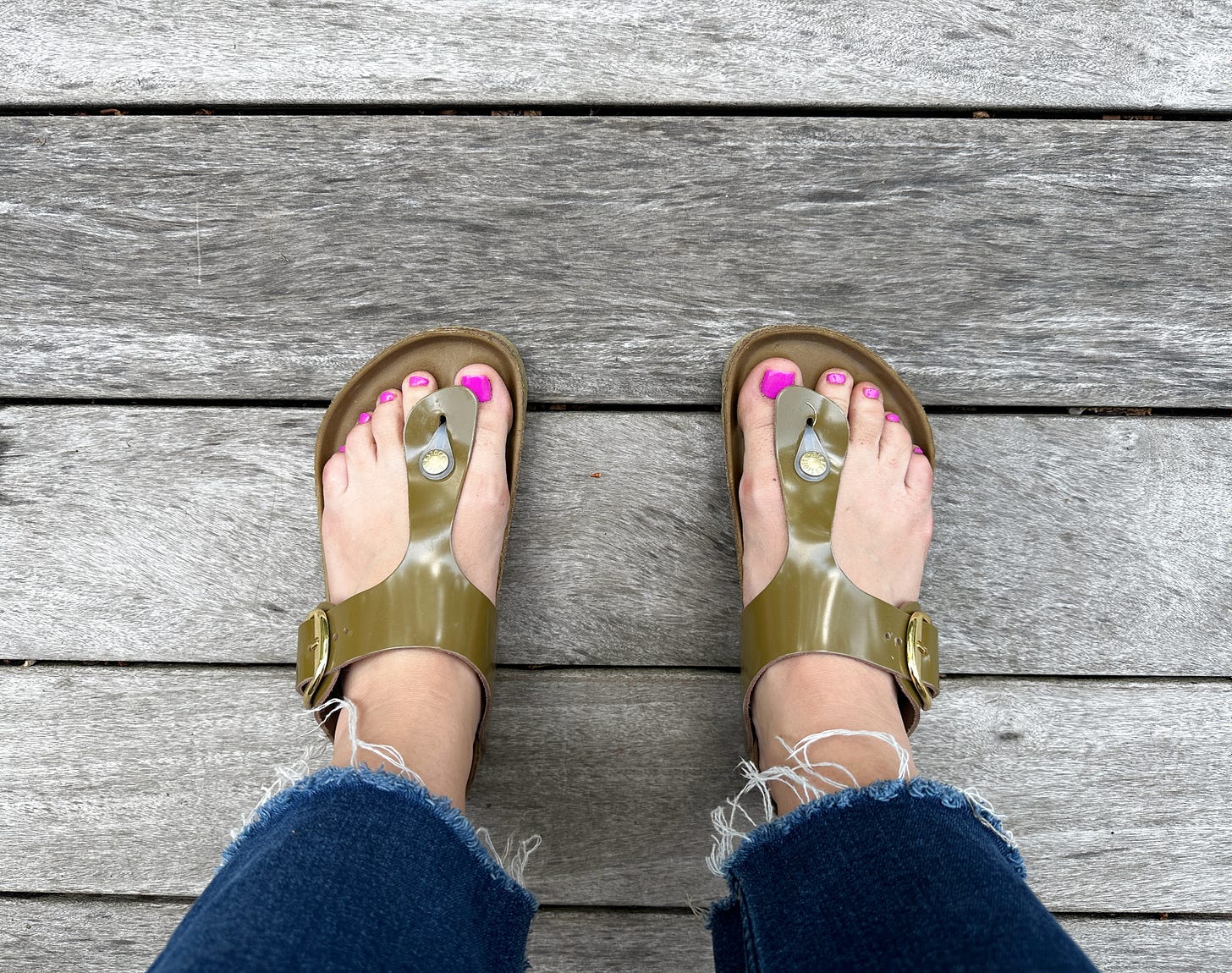









Share this post